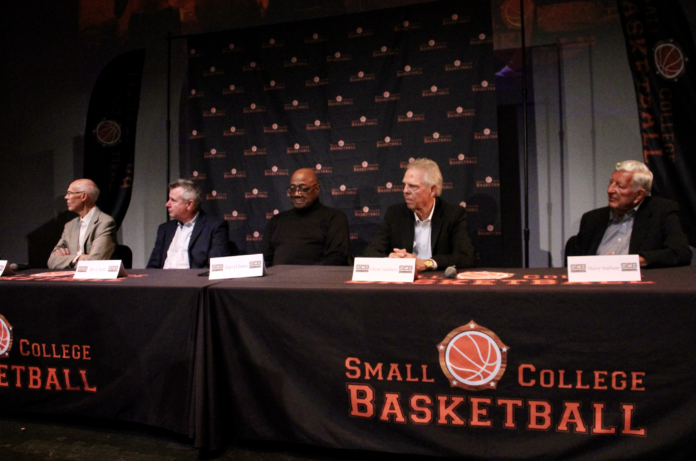
Emma Lauren Poole | Nov. 12
Sports Editor
On Friday, Nov. 4, the Polk Theater came to life as the newest class of members in the Small College Basketball Hall of Fame were honored. The induction ceremony, held at the theater, recognized 12 influential figures in SCB history and was held in conjunction with the annual SCB Hall of Fame classic, hosted over the course of the weekend by the Mocs.
The Small College Basketball company has the mission of uniting teams under the NCAA Division II, NCAA Division III, NAIA, USCAA and NCCAA levels. Florida Southern is a part of the group, and will host the tournament until 2024.
Each year, the SCB HoF committee is tasked with selecting a group of honorees that have made significant contributions to the basketball programs of small colleges across the nation. John Ebeling, the Sunshine State Conference’s all-time top men’s basketball player for the first 25 seasons, was a member of the inaugural SCB HoF class in 2016.
The Small College Basketball Hall of Fame has honored between eight and 12 players, coaches, and contributors in the history of small college basketball every year since then, excluding one year due to the pandemic.
Five of this year’s 12 inductees spoke at a press conference before the induction on Nov. 4 about their basketball careers and the impact that being involved with small college teams had on them.
Former University of Central Florida basketball player and Flagler College basketball coach Bo Clark was one of the honorees.
“There’s more of an emphasis on success [on a small college level],” Clark said. “I really like the emphasis on academics.”
During his time at UCF, he had the unique opportunity to play on a team that his dad coached. While not every player has the chance to be coached by their father like Clark did, he recognizes that on smaller campuses, the relationships between the coaches and players are very special.
Clark’s years of playing basketball for his dad led Clark into his own career in coaching. He coached at Flagler College and was able to see firsthand how unique small college basketball is.
Clark recalls his years at UCF, which included memorable games in Lakeland.
“We had some epic battles where the tournament is, at Jenkins Field House,” Clark said. His memories include crowds of up to 3,500 in attendance at games.
Although Clark could’ve played on the Division One level, he doesn’t regret his decision to play for a smaller program.
“Were there tough times? Absolutely,” Clark said. “But was there more joy? Absolutely.”
This joy and sense of meaning is what makes small college basketball so special for all of the honorees.
“It means a lot to me because I’m a small college guy by choice,” inductee Darryl Jones said. “It’s the best decision I ever made, as an 18-year-old.”
Jones says he still talks to his college teammates more than 50 years after they graduated from college. He firmly believes that the team’s friendships are a tribute to the smaller atmosphere of Benedictine College.
“The most significant thing [about small college basketball] to me is the sense of community,” Jones said. “Because it’s so small, you know everybody.”
The influence of basketball on players like Jones has stood the test of time.
“I love my school,” Jones said. “I know guys who’ve never been back to their schools in 50 years – I never miss a year going back!”
Jones and fellow inductee Glynn Saulters played on the same all-American team, an opportunity that they both cherish to this day.
Saulters, a former professional basketball player and member of the 1968 gold-winning USA Olympic basketball team, is familiar with the term “small,” and says it’s relative.
He jokes about the definition of small, saying that he and his wife represent 25% of their high school graduating class of eight in rural north Louisiana. Saulters agrees with the rest of the inductees that the small college basketball atmosphere is like no other.
“Everybody knows everybody and you’re a close-knit group, academically and athletically,” Saulters said.
Each of the inductees have their own stories of how playing basketball at a small college has shaped their lives, and they look to the future and call upon the players, coaches, and contributors of today to continue their legacy, cultivating an environment for growth and success both on and off the court.
When looking back at his life and career, inductee Jim Bond can see the part his basketball coach played in helping him become the man he is today.
“He taught me how to play basketball,” Bond said. “He shaped my life.”
Bond turned down an offer to play for the Minneapolis Lakers after college in order to become a minister. Later, he had the opportunity to officiate his coach’s funeral.
“It was a great privilege of my life to preach the memorial service for this man,” Bond reflected. “He taught me how to play, but more importantly, he taught me how to be a Christian gentleman.”
Bond’s story is a testament to the impact small college basketball can have beyond the court.
Another inductee, Coach Harry Statham, echoes Bond’s sentiment. As the first college basketball coach to achieve 1,000 wins, Statham has plenty of experience within the small college basketball community. Throughout his 52-year-long career, the teams he coached won 1,122 games in total, and to this day, Statham is still the third-winningest coach in college basketball history.
Recalling his years as a basketball player before coaching, Statham says that small college coaches were always influential in players’ lives and served as people the players could look up to.
“It’s up to us to instill that example and bring the youth along,” Statham said.
Statham implores the current and future generations of small college basketball to keep the game alive and strong.
“We need to preserve and keep Small College Basketball,” Statham said. “Good things are ahead of us – great things.”







